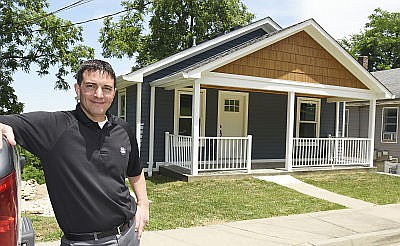The Jefferson City rental facade program is accepting applications for property owners to renovate rental properties and receive reimbursements for the improvements.
Also known as the Neighborhood Reinvestment Act, the rental facade program reimburses property owners for external aesthetic improvements on buildings in, adjacent to and east of the Old Town District if the improvements cost more than $10,000.
The eligibility area extends from Stadium Boulevard north to the river and from Dix Road, Southwest Boulevard and Boonville Road east to Clark Avenue. To be eligible for the program, the residence has to be a detached single-family home or two-unit duplex constructed before 1960.
The goal of the program, approved by the City Council in 2014, is to "enhance the aesthetics of the city by improving the facades" of rental properties, according to the program's statement of philosophy.
Over a year ago, Charlie Frank was able to replace the roof, siding, doors and windows, as well as add a new porch to his 706 Swifts Highway residence through the rental facade program. He said having the program gave him more options and helped him do more than just the minimum improvements.
"Having that reimbursement allowed me to justify doing the things that make it look like what it looks today and making it better quality," he said.
A property owner can submit an application - which includes the estimated project cost, a financial statement saying the owner can fund the project, bid statements with proposed improvements, a drawing of the changes and an explanation of how the renovations will mimic the original building's construction - to participate in the program.
If the project meets the criteria, the landlord will be reimbursed up to half of the improvement cost, up to the maximum reimbursement amount of $5,000 for a single-family rental or $10,000 for a duplex.
The deadline for program applications is June 30.
Due to the program's limit fund of $20,000, some applicants might not be selected, Neighborhood Services Coordinator Jayme Abbott said. Property owners are selected based on the cost of the projects and the impact the improvements would have on the surrounding area. About two or three properties are selected a year.
The facade improvement committee - made up of seven architects, people with construction backgrounds and members of the Jefferson City Historic Preservation Commission - approves applications, as well as determining what improvements are eligible for reimbursement. If the application is approved, the building will be inspected to make sure it meets city codes.
The improvements have to be similar to the appearance of the building when it was constructed and look similar to other buildings constructed on the same block around the same time.
Some improvements might involve replacing exterior items of the building that were not original, like vinyl or aluminum siding; repairing or replacing walls, windows, railings and steps so the features mimic what was offered at the time the building was constructed; or removing awnings or canopies that do not match with the time the residence was built.
Improvements not eligible for reimbursement include adding or redoing landscaping; replacing or repairing interior floors or ceilings; installing or fixing air-conditioning or heating units; or upgrading interior electrical wiring.
"It's got to be sensitive to the historic preservation," Abbott said. "We don't want someone to put siding over the brick, put in windows that are today's style versus the windows that mimic what was available at the time the house was constructed."
Abbott said property owners will know if their applications were accepted by the end of July or beginning of August.
After a property's renovations are completed, the city will inspect the building to make sure the owner complied with the program's criteria.
Participants must complete exterior improvements by Oct. 31, 2018, to receive reimbursements.
The rental facade program is similar to the city's downtown commercial facade program, but downtown area property owners receive tax reimbursements for exterior improvements, while the rental facade program reimburses the cost of the renovations.
If a property owner participates in the program, he or she must own the property for at least five years after becoming eligible to do the program. If not, the city can regain the full amount of the reimbursement.

